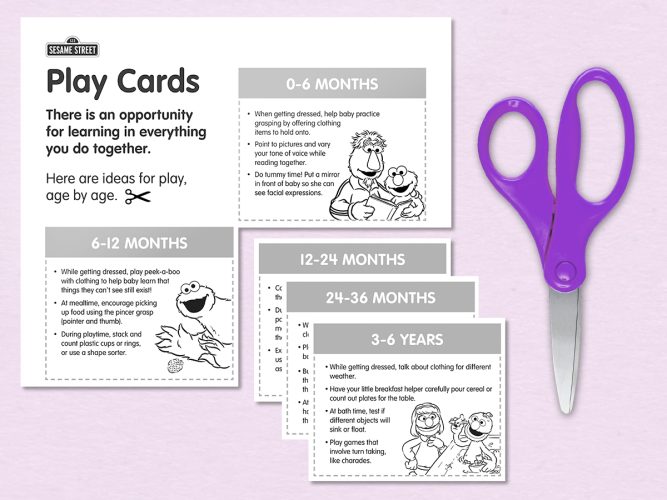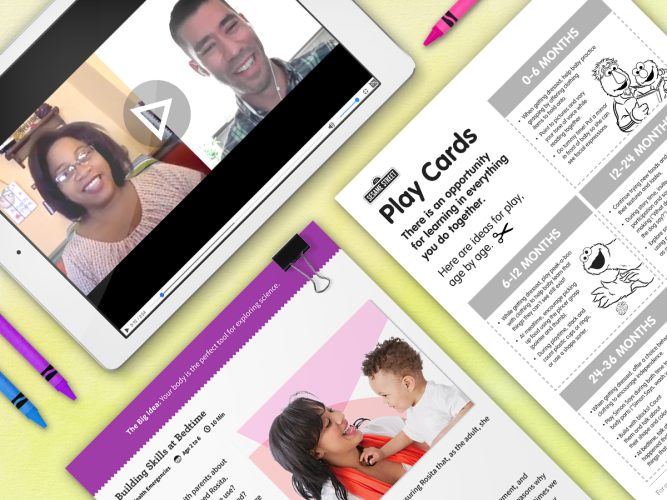
Growing and Learning Through Play
Children love to play—and as they do, we can help them explore the world around them and practice important skills.
Children are wired to play—you can see this from very early in a child’s life. Even at just a few months old, babies’ curiosity about the world around them is evident when they reach for objects, mimic facial expressions and sounds, and giggle and laugh. Their growing brains crave these playful connections, which help to build a sense of safety and trust.
That play-based, curiosity-driven way of moving through the world continues as children get older. Playful experiences serve as a vehicle for children’s growth and development. Through play, children learn to regulate their feelings, adopt new perspectives, think flexibly, solve problems, and much more. That’s why it is so important for the grown-ups in young children’s lives to support, encourage, and model many ways to play. Consider these ideas to facilitate children’s play:
- Tower talk. Playing together helps children consider new ways of doing things, uncover different perspectives, and build cooperation skills. Together, build a tower (out of blocks, food storage containers, paper cups, or whatever you have on hand) and taking turns adding to the stack. With each turn, share something about yourself. As the tower gets taller, your relationship will grow, too!
- Mix it up. Add play into your daily tasks by inviting children to help you think of different ways to get things done. Instead of folding towels, you might roll them. Instead of walking to get the mail, you might hop like a bunny! What other ordinary chores can you do in a creative, playful way?
- Imagine it! Store-bought toys can be special, but don’t underestimate the playful power of objects you might have laying around the house. With just a little imagination, bowls turned upside-down become a drum set. Couch cushions become castle walls. And that box is definitely a spooky cave!
- Push play. When children (or grown-ups!) have big feelings, such as frustration or sadness, a playful outlook can make a big difference. Together with children, draw a circle on a piece of paper. In the circle, draw two lines (like a pause button) and an arrow (like a “play” button). When things start to feel serious or stressful, “push” the button to “pause.” Take a deep breath and think of a way to approach the situation playfully. Now pretend to press the “play” button. Can you turn this stressful moment into a game?
Play…All Grown Up
As you know, children look to grown-ups for guidance for almost everything, including play. It can be difficult at times for us to tap into our playful side, but it’s worth the effort! Keep these things in mind:
- Rediscover it. We can model play by rediscovering it for ourselves. Play may look a little different as a grown-up, and that’s okay. The key is to find—and regularly do—things that bring you joy. Consider joining a recreational sports team, book club, or video game league. Fill pages of a journal with short stories, or a canvas with colorful paint.
- Schedule it. While spontaneous play is wonderful, with our busy schedules, being intentional can help us make play a regular part of our lives. Can you set aside time for play each week? Can you schedule it into your daily routine? You might try to choose a time each day in which you need a natural pick-me-up, such as in the middle of the afternoon or first thing in the morning. Include the children in your care, but remember that you can play without children, too!
- Savor it. In the video above, Zoraima Rosario-Rolón, provider to FFN caregivers, explains how the “lightbulb moments” that children often experience during play can also be a beautiful gift for caregivers to receive. As you nurture a playful attitude in yourself and in your relationships with children, you can be confident that you truly are making a positive difference. You’re setting the stage for children’s success in life!

Play Cards
Children love to play—and as they do, we can help them explore the world around them and practice important skills.

Social Chat: Learning Through Play
Children love to play—and as they do, we can help them explore the world around them and practice important skills.

Learning Through Play: Tips & Tools for Providers
Children love to play—and as they do, we can help them explore the world around them and practice important skills.
